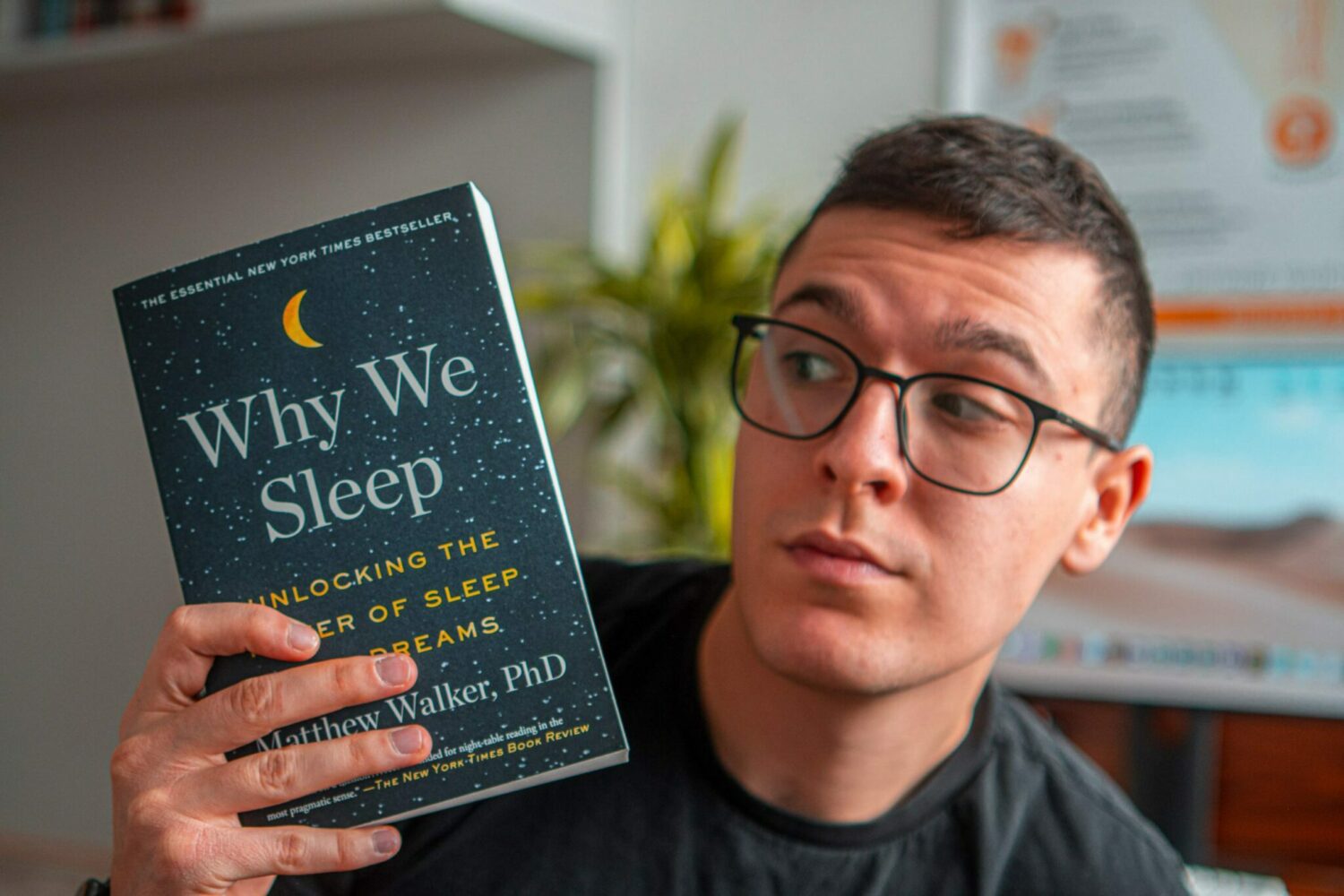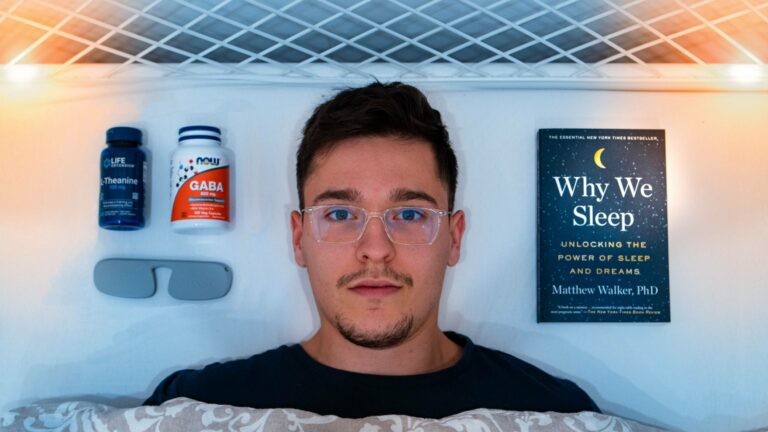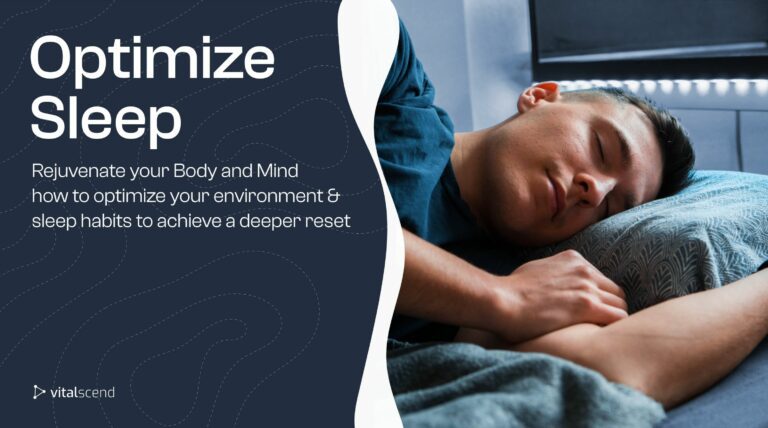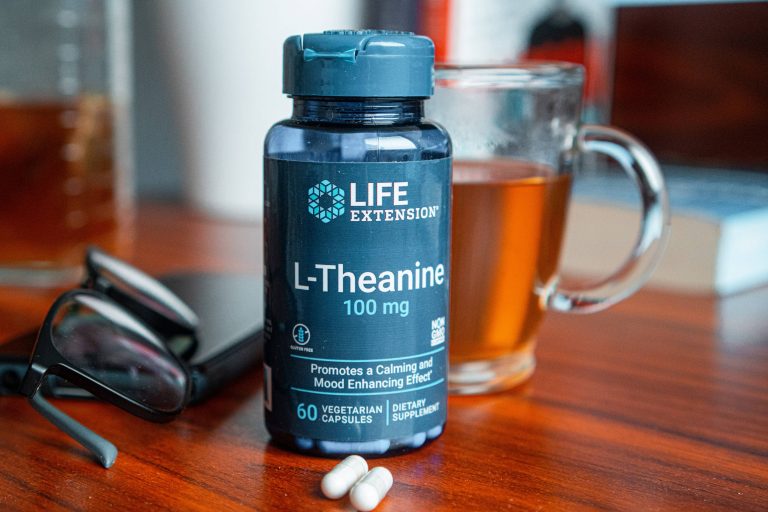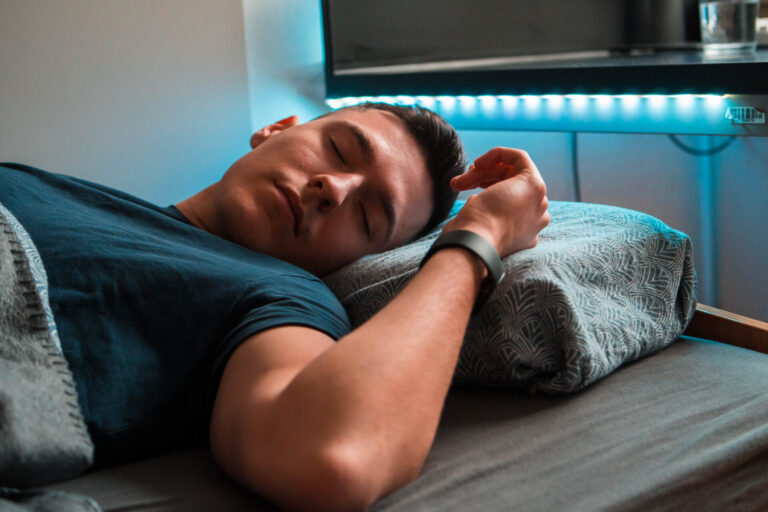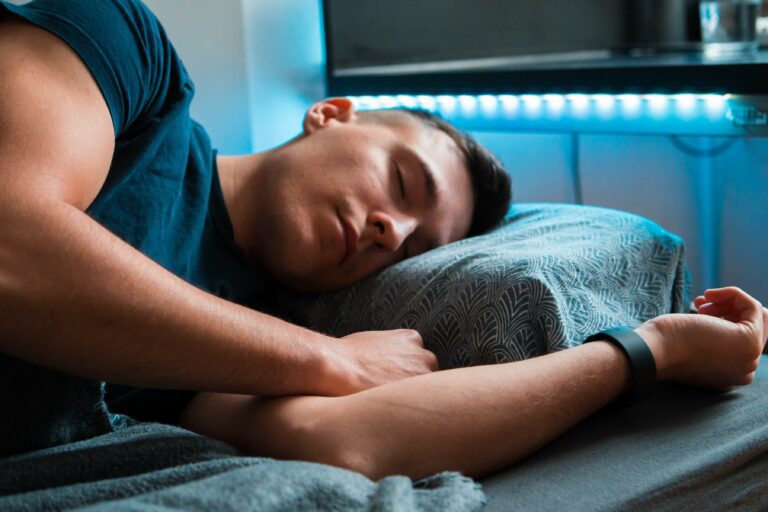6 Tips to Improve Sleep: Blue Light, Cold, Supplements, & Breathing
In such an overactive world improving sleep may be the best strategy to enhance your health, longevity, and boost brain performance. There are many tips to improve sleep, and we’ll focus on the ones we’ve found most effective, and easy to adhere to.
From wearing blue blockers at night and sleeping at cool room temperature – to discovering many natural sleep aids, we cover it all.
What is Sleep & Why Is it so Important
Sleep is a very complex, natural process of regeneration. It is a state in which the mind and body take a rest and reset. Toxins are flushed out, muscle tissue is grown, neurotransmitters are secreted, and the brain is renewed, so we can start fresh. Nerve cells reorganize, junk cells are excreted, energy is restored and the body is in repair mode.
There are different levels and phases of sleep. From being awake and alert to light sleep, up to deep and REM sleep. Between the awake and REM sleep state, there are 3 N’s or N1, N2, and N3 stages which are progressive sleeping stages called non-rapid-eye-movement sleep, leading to REM.
Benefits of Deep Sleep
With all these tips, we aim to reduce the time to fall asleep or sleep latency, improve sleep quality and consistency, and induce longer REM sleep duration for proper repair and regeneration. The goal is to wake up refreshed, alert, and energized. Deep sleep promotes numerous benefits and supports basic physiological functions.
Optimizing sleep has been shown to potentially:
- improve brain function, cognitive performance, and memory
- accelerate fat loss, speed up muscle growth and metabolism
- boost energy, freshness and reduce fatigue
- increase focus, learning (neuroplasticity), and alertness
- improve hormonal balance and neurotransmitter secretion
- improve and balance mood, reduce depression and anxiety
- supports your immune system function
- is associated with greater cardiovascular health
While in many studies subjective measures incorporating different questionnaires on sleep quality are used, the objective way to test it out yourself is to invest in a good sleep tracker. These include the likes of Oura ring, being the best one out yet. A few other pieces of good tech include Muse S, Kokoon Nightbuds, Sleepon Go2 Sleep, Whoop 4.0, etc.
What Is the Best Temperature for Sleep?
The best temperature for sleep varies from person to person, but generally, a cool room temperature between 60-67 degrees Fahrenheit (15-19 degrees Celsius) is recommended for optimal sleep.
What are some tips to improve sleep quality?
The top 3 things to do right now to improve your sleep are a consistent sleep schedule, wearing blue blockers at night, and limiting caffeine intake to no later than 3 PM.
What are some natural sleep aids for improving sleep quality?
Some of the top natural sleep aids include relaxing techniques like massage, deep breathing, or meditation. In terms of supplements, l-theanine, chamomile tea, magnesium, and GABA may enhance one’s sleep.
6 Tips to Improve Sleep
Optimizing your sleep may be one of the best bang-for-your-buck strategies for living longer, being healthier, and feeling better. Changing just a few little things in the bedroom today is the first step to being your faster, healthier, happier, and more productive self tomorrow.

1. Wear Blue Light Blocking Glasses at Night
Manipulating light exposure has a tremendous effect on your circadian rhythm. Blue light makes you awake and alert. It acutely boosts cognitive performance, focus, and sharpness.
But blue-light exposure at night can interfere with this circadian rhythm and disrupt your sleep. It suppresses melatonin secretion, which is an important hormone that aids in deep sleep. (1) (2)
Artificial light from monitors, tablets, and phones activate certain receptors sensitive to blue light which tricks our brain into thinking it’s daytime. Such activation reduces melatonin secretion and interferes with deep sleep.
The use of amber-shade glasses which block blue light at night has been shown effective in improving total sleep time, overall sleep quality, and soundness of sleep. (3)
Check out: What Are Blue Light Blocking Glasses? 3 Reasons Blue Blockers Work
Blue blockers are known to improve jet lag symptoms and night shift work fatigue. They’ve been used for insomnia, to improve sleep disorders. They reduce the activation of photoreceptors that sense blue light.
summary
Blue light emitted from screens can suppress melatonin secretion, interrupt sleep, and mess with your circadian rhythm. The easiest way to ditch night-time blue light is by wearing blue blockers at night, usually amber-shade glasses.
2. Stick to a Consistent Sleep Schedule
Your biology has a schedule, it lives in cycles. The 24-hour cycle is one of the most important ways our brains can coordinate time and wake-sleep cycle patterns. The most profound factor that affects this is light.
Your body gets used to a certain time of the day when it needs to shut down. If you don’t go to bed at similar times, your body can’t distinguish when it’s really time to sleep.
Research on Sleep Schedule Consistency:
- Being consistent with your sleeping schedule is one of the best ways to fall asleep faster and improve sleep quality. (4)
- Studied in 23 young healthy adults, a structured sleep schedule improved sleep timing regularity, and aligned circadian rhythm better, without significantly affecting sleep duration and quality. (5)
- Irregular sleeping patterns are associated with shorter sleep times. Such behavior can reduce sleep quality and lead to sleep insufficiency.(6)
- It also seems that a regular sleeping schedule can heavily impact our mood. Researchers found that variability in sleep parameters highly affects mental health and that consistent sleep may help improve mood and mental health. (7)
Sleep is a natural repair process that allows neural networks to re-organize, the brain to detoxify, and neurotransmitters to stabilize.
It’s no secret that good sleep quality, consistency, and duration are associated with higher academic performance, as sleep is essential for brain health and cognition. (8)
summary
Staying consistent with your sleeping schedule can improve sleep latency and regularity. It communicates to the brain what’s the right time habitually, to slow down and fall asleep
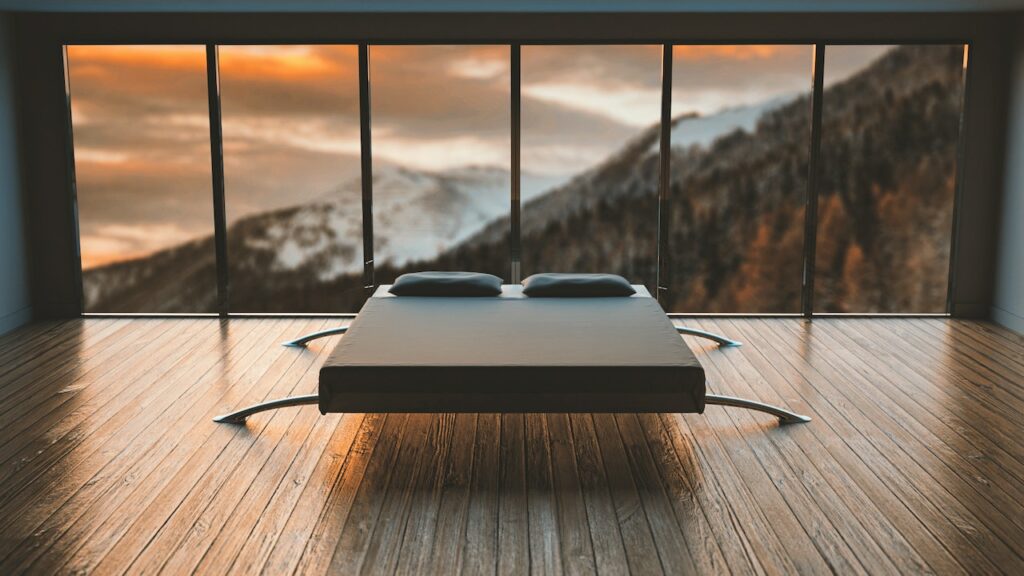
3. Sleep at a Cool Room Temperature
Reducing core body temperature helps us fall asleep faster. But it’s also the other way around. During deep sleep, our body’s core temperature falls down. So, is sleeping at lower temperatures important? Hell yes.
During the Non-REM sleep phase, our body and brain temperature cool off. If the body needs to work hard to maintain thermoregulation, sleep is disrupted. However, skin warming may enhance vasodilation and stimulate cooling mechanisms. (9)
So, maybe a hot relaxing shower before bed isn’t such a bad idea?
Two hours after we fall asleep, both melatonin secretion increases and body temperature lowers. (10)
So this begs the question, what’s the optimal sleeping temperature?
Well, if it’s too cold that you shiver, you’ll wake up. If it’s too hot that you sweat it out, it’ll also disrupt your sleep, reduce REM deep sleep and mess with regeneration.
It seems that the optimal temperature for sleep is somewhere around 15 to 19° C, but it’s also important that the room is black-out dark, and quiet. Cooler temperature allows the body to cool itself, which enhances sleep latency and % of deep sleep. (11) (12)
Exposure to heat can disrupt your sleep even more than traffic noise. In one study they took 8 healthy young men and tested how noise + 35° C, noise + 20° C, no noise + 20° C, and each individually affected sleep. The conclusion was that heat is more sleep-disruptive than noise. (13)
Sleeping at a cooler temperature has also been associated with benefits like better sleep quality. On the other hand, insomnia and awakenings are partially due to thermoregulation problems (being too hot).
summary
Your body has the coolest core temperature at night, in deep REM sleep. Sleeping in a cooler room can allow your body to cool off faster and fall asleep.

4. Consider Natural Supplements for Sleep
The brain has two major neurotransmitters that dictate wakefulness-sleepiness. It’s the Glutamate vs. GABA cycle.
- Glutamate is an excitatory neurotransmitter that activates you.
- GABA is the opposite, an inhibitory one that relaxes you.
In a hyperexcited state, most of us have overstimulated Glutamate power brains. Such overactivation makes us anxious and overwhelmed, and makes it harder to fall asleep. Certain minerals like magnesium and herbs like valerian root, or direct amino acids like GABA are known to enhance inhibitory mechanisms that improve sleep latency & quality.
Valerian Root – it’s a herb that has been shown to promote sleep, reduce insomnia and improve sleep quality. It’s a relaxing, natural sleep aid believed to be relatively safe compared to other sleep aids. (14) (15) (16)
Magnesium – it’s an important electrolyte (mineral) that allows our musculature to relax. It’s a GABA agonist that prevents overactive muscle contractions. In many studies, it has been shown to improve sleep latency, quality, and measures of cortisol and melatonin. (17) (18)
Lavander
Another popular herbal oil which may improve autonomic nervous system tone, and positively affect mood. It decreases arousal and helps us relax. Studies show lavender oil inhalation can increase the brain’s theta and alpha activity. (19) (20)
Glycine
An interesting amino acid, a neurotransmitter that plays a role in wake-sleep cycle control. It helps our body cool down, may reduce sleep latency, and has been shown to improve subjective sleep quality. (21) (22)
L-theanine
It’s an effective amino acid with anxiolytic properties, found in green tea. It prevents hyperexcitation, and it’s used as a natural tranquilizer. L-theanine can promote alpha brain waves, improve sleep quality and reduce drowsiness. (23) (24)
GABA
One of the most effective sleep aids in my opinion is gamma-aminobutyric acid. It’s the main inhibitory neurotransmitter, allowing us to rest and sleep. In combination with L-theanine, or alone it has been shown to improve sleep quality, reduce sleep latency, and increase REM and NREM phases. (25) (26)
summary
Natural sleep supporters like Magnesium, Gaba, L-theanine and Valerian root can exert anxiolytic effects, help you relax, and increase GABA (inhibitory NT) levels which helps you sleep better.
5. Practice Relaxing Breathing Techniques
Deep breathing techniques can deactivate panic receptors which are keeping us anxious or overwhelmed. Such an anxiolytic effect can enhance mood and help us fall asleep.
Meditation, relaxation techniques, and deep breathing have been long used for controlling the tone of the autonomic nervous system and reducing hyper-arousal. (27)
Combining both deep breathing techniques and body scan meditation has been shown to improve sleep quality and quality of life in older adults. (28)
Combined with sleep hygiene, breathing has been shown to reduce pain and insomnia in people with burn injuries too. (29)
Many sleep-related issues and mood disorders are heavily affected and made worse with improper breathing patterns like short, infrequent, arrhythmic, chest breathing.
Breathing can help with sleep in many ways. Partially, by deepening our breath we signal to our central NS it’s time to slow down. Heart rate goes down, oxygen goes up.
Summary
Deep breathing can regulate autonomic nervous system tone, preventing hyper-arousal and deactivating panic receptors. Such an effect helps the body to relax and fall asleep faster.
6. Cut Caffeine Intake After 3 PM
Coffee is a CNS stimulant, making us aroused, alert, and focused. It’s all good, in the morning. But caffeine has an average half-life of around 6 hours, meaning you could expect sleep disruptions if you have it later than 3 PM.
Consuming more caffeine in one study on Australian adults was negatively associated with sleep time and sleep quality. (30)
Another experiment showed caffeine intake 0, 3 or 6 hours before bed all significantly disrupted sleep, hence why scheduling your sleep and caffeine further away is important. (31)
It’s no surprise that decaf coffee won’t have the same sleep-disruption effects as the caffeinated version. (32)
So, if you really want that taste of coffee after 1-3 PM, or you’ve already had your 2 cups of coffee, enjoy yourself a little decaf break. Thank me later!
summary
Having your last cup of caffeine until 1-3 PM is crucial for a good night’s sleep. Caffeine is a potent CNS stimulant that can interrupt sleep at high doses or if consumed later in the day.
Conclusion
Sleep is a natural regenerative process where the body repairs itself, re-organizes neural pathways, and restores energy. Optimal sleep is very important for better health, vitality, and longevity. Poor sleep can lead to poor cognition, inflammation, poor recovery, mood issues, hormonal imbalances, etc. Sleep-enhancing strategies aim at reducing sleep latency, improving sleep quality, and getting more deep REM sleep.
The best tips to improve sleep include: blocking blue light at night, cutting caffeine to 3 PM, practicing deep breathing techniques, sleeping in a dark and cool room, and having a consistent sleeping schedule. Also, supplementing with natural sleep aids like Magnesium, L-theanine, or GABA can reduce overstimulation and help us relax, slow down and fall asleep.

